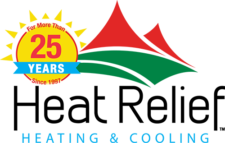Portland touts some of the best summers in the country; low humidity, limited rainfall, mild temperatures, and practically no bugs! But Portlanders know our beloved temperate milieu tends to break-way to some insane heat waves in July and August. And, keeping your home air conditioned and comfortable can be expensive when you’re trying to beat the sweltering heat. Here are a few tips and tricks for your HVAC system to avoid letting your home’s cooling bills from getting you overheated this summer.
1 Change It Up.
When was the last time you changed your HVAC system’s air filters? It’s one of the easiest things you can do to boost your system’s performance, but it’s too often overlooked. Dirty filters kill your A/C’s efficiency. In fact, dirt is the number one reason for HVAC system failure. It’s no surprise, properly maintained equipment lasts longer and keeps your system running efficiently. Filters should be cleaned or replaced monthly. Make it a habit by keeping a supply of filters on hand.
2 Protect Your Unit.
Adding more trees or vegetation to your home’s landscaping not only delivers added curb appeal but offers up increased protection to your A/C unit. Keeping your air conditioning system in shaded areas can cut energy consumption by keeping the unit cooler as temperatures soar. Plus, the shadowing can block the amount of solar heat beaming onto the roof and through the windows, allowing your system to work more efficiently.
3 Open Up.
When your system was installed, the ductwork was balanced. The amount of air going into the system is equal to the volume going out. Closing off the vents in unused rooms or areas disrupts the balance and adds stress to the overall system. This causes leaks in your system and forces the unit to work harder – costing you more money in the long run. Make sure all of the vents in your home are open and clear of debris.
4 Let Gravity Bring It Down.
Heat rises, it’s a matter of physics. So, during the summer months when the heat shoots to the ceiling or second floor, help displace the hot air with ceiling fans. Fans help move the air around the room and help your home maintain an even temperature which can give your HVAC system a little break. By flipping on the ceiling fan, you can raise the thermostat setting about 4°F with no reduction in comfort. But remember, fans are designed to cool people, not rooms, by creating a wind chill effect. Turn off the fan when you leave a room to avoid wasting energy.
5 Feel the Heat.
Set your thermostat as high as comfortably possible during the summer. By lessening the difference between the inside and outside, the less your system will have to work to keep your place comfortable. Up the temperatures when you leave the house for more than eight hours at a time – like when you head out the door for work in the morning – to lower your cooling bill.
6 But Not Too Much Heat.
On the handful of particularly hot days we have here in Portland, skip using the over. Cook using the stove, use a microwave or open a craft brew and light up the grill! Move lamps and TVs placed near your thermostat. Your thermostat picks up on the radiating heat from the electronics, causing an inaccurate temperature reading and likely increasing the amount of work your HVAC system will have to do to compensate. Make sure you’re turning off the devices when you leave a room too. Did you know only about 10-15 percent of the electricity incandescent lights consume turns into light? The rest results in radiating heat.
7 Take your Time.
After a day in the sun you may try setting your thermostat at a cooler temperature than normal in an attempt to “quick-cool” your home. Don’t. Quick-cooling your home will not lower the temperature any faster and it could result in excessive cooling and increased cooling expenses.
8 Find an HVAC Doc in Portland
Schedule regular maintenance for your HVAC system to make sure it’s running at full capacity all season long. Energy Star recommends annual check-ups to prevent failure and avoid unwanted costs. Check out our Ultimate Savings Agreement to make sure you’re covered.

